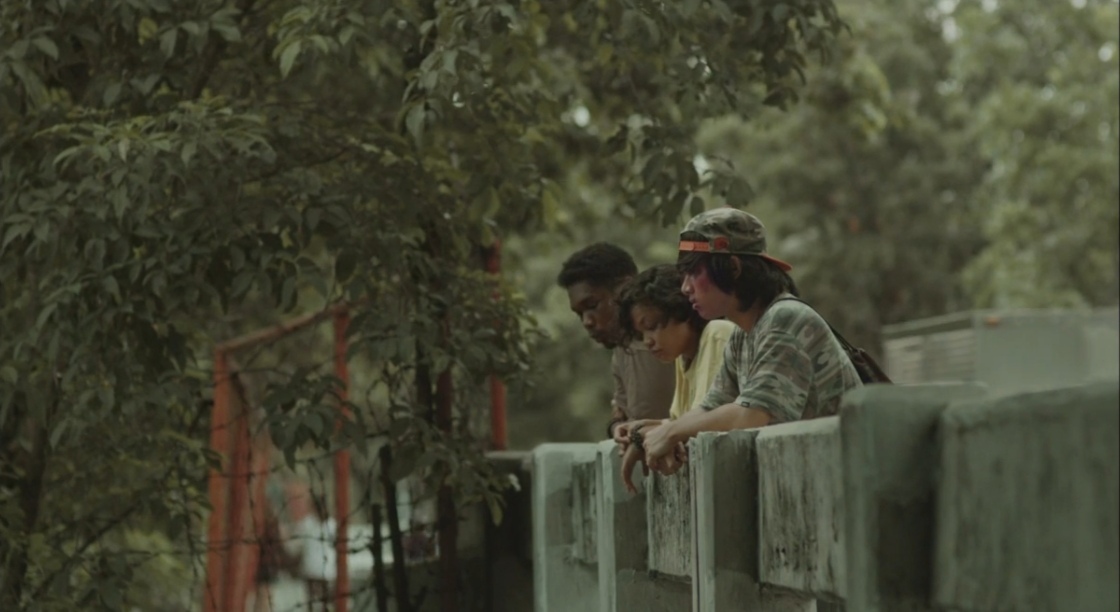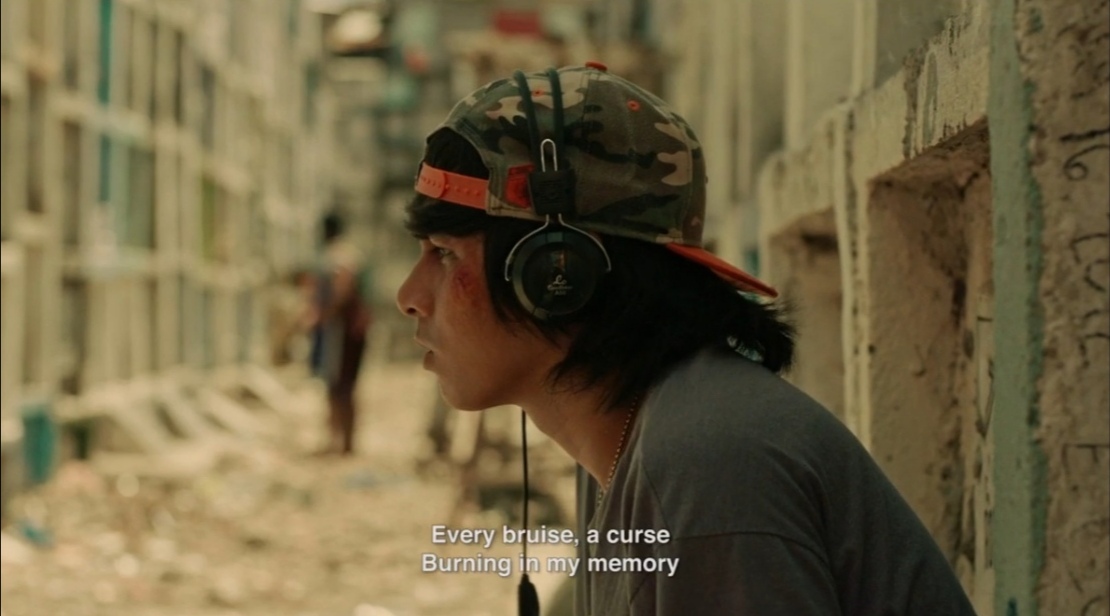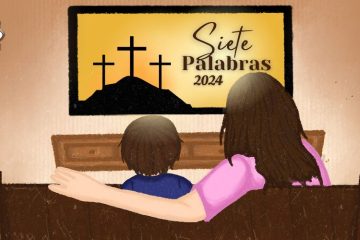
TO SET a dream flying, it must not have a tail made of chains. These bolts weigh someone down and deny them a chance to change their lives. Poverty has a corrosive effect on people’s sense of life autonomy. Adding to the predicament is the intolerable and abusive systems that deliberately extinguish the fire out of someone’s life.
Directed by UST Alumnus Alberto ‘Treb’ Monteras II, Respeto tells a story of two worlds vastly different from each other, uniting them through passion and adversity. It explores the similarity between poetry and rap. However, tied into it is the critique of two administrations that left trails of blood in the country. The film sheds light on life’s most important theme, respect.
“Kung meron ka lang respeto sa sarili mo, respeto sa bawat isa, respeto sa boses ng bawat isa, respeto sa lahat ng bagay ‘diba, I mean—hindi siguro ganito ka-gulo ‘yung mundong ginagalawan natin (If you have respect for yourself, respect for others, respect for the voices of others, respect for all things, the world we are living in would not be this chaotic),” Director Treb Monteras told The Flame.
Clash of wordsmiths
The multi-awarded film follows the interwoven destinies of an aspiring, young rapper, Hendrix (Abra) and a radical poet of the Martial Law, Doc (Dido De La Paz.) A pair, who are initially in conflict, meet in the middle wherein the passion for wordsmithing brings them together.
Doc takes in the downtrodden Hendrix under his wing, all the while teaching him a bountiful amount of experience from his younger days as a poet. Hendrix, on the other hand, is told more than what he ought to know about his ‘mentor.’
As the director and co-writer of the film, Monteras reveals that his idea for the film was supposed to be an inspirational story. However, he explains that, on some occasions, it is in the process of filmmaking or conceptualizing when one realizes what the film is actually about.
“Parehas sila (Hendrix and Doc) ng ginagawa, magkaiba lang ng panahon, magkaiba lang ng style. […] But of course ‘yung start ng story was different from what it eventually became ‘eh. (They do the same thing, it’s just a different era, a different style. […] But of course, the start of the story was different from what it eventually became.) It starts as a simple inspirational film and it became something else,” he said.

Duterte’s crusade against drugs
The film explores the cross-over of hip-hop music and Philippine poetry, which is also used in cementing the bond between the two main characters. Moreover, these aforementioned art forms are utilized in tackling societal issues, giving the audience a look into the current administration’s ‘war on drugs.’
“Ang laking naging effect netong bagong administrasyon na ‘to sa thinking ng mga tao. Dahil doon, naging laganap ang historical revisionism ‘din, na parang napawalang-bahala ‘yung lahat ng pinaghirapan or ‘yung lahat ng pagdurusa ng libo-libong biktima noong panahon ng Martial Law (The new administration had a great effect on the thinking of the people. Because of that, historical revisionism became prevalent too, disregarding all of the hardships or sufferings of thousands during the time of the Martial Law),” he explained.
Part of Duterte’s campaign was to warn the nation of the emergence of drug-related crimes, and that he will act as the “iron fist” against this social problem.
Meanwhile, Monteras believes that drugs “is not our biggest problem” rather it is poverty. “Poverty ang pinaka problema natin. Poverty dahil sa corruption, poverty dahil sa lack of opportunity, poverty dahil sa kawalan ng edukasyon (Poverty is our biggest problem. Poverty caused by corruption, poverty caused by the lack of opportunity, poverty caused by the lack of education.).”
He emphasized that Duterte’s campaign has caused a “culture of hate” among the people, especially his supporters. Due to this, hate, anger, and injustice were blamed on drugs.
Moreover, what saddens Monteras was that legitimate institutions such as the media were also given blame by the people.
“Ang kampanya naman nila ay hindi lang sa drugs ‘eh. Ang kampanya nila is i-discredit lahat ng mga institusyon na hadlang sa kanila. Katulad ng media, ‘diba? […] Parang ang hirap maging miyembro ng media ngayon dahil sa dini-discredit nila. […] Yung campaign nila against ‘mainstream media’, ‘fake news. (Their campaign was not just about drugs. Their campaign is also to discredit all the institutions that are against them. Just like the media. It seems that it’s difficult to be a member of the media now because they discredit them. Their campaign is against ‘mainstream media’, ‘fake news’).”

Linking politics and art
Respeto is plaited with the national issues of police brutality, domestic abuse, misogynistic views, and drug abuse. Through politically charged verses and scenes, the film attempts to expose the cruelty of the Duterte administration. Disguised as a film about rap music, Monteras said that his goal is “to get the young ones to see the film.”
Nevertheless, Monteras says that it is a film for everyone. He encourages everyone to watch this film to open their eyes to the injustice that is happening in society. However, Monteras notes that the people should not seek justice in the film but in real life.
Last Sept. 15, an International Criminal Court pre-trial chamber authorized the start of investigations on the crimes against humanity committed under President Rodrigo Duterte’s ‘war on drugs’ in the Philippines. Many believe that this has taken the country closer to achieving justice for the deaths of thousands.
Monteras agrees with this sentiment, however, he adds that the people still has a role to play in this feat. “Kung tayo ay hindi aasa lamang sa ICC para makamit ang hustisya, hindi lang aasa sa pelikula para makamit ang hustisya. Kung tayo mismo, bilang kabataan, ay pupunta at gagawin ang responsibilidad bilang mamamayan na bumoto sa darating na eleksyon […]. Tingin ko, we’ll be a lot closer to achieving justice (If we will not only depend on the ICC for justice, on the film for justice. If we, as the youth, act on our responsibility as citizens in the coming elections […] I think we’ll be a lot closer to achieving justice).” F




Beautifully written! Thank you for this!